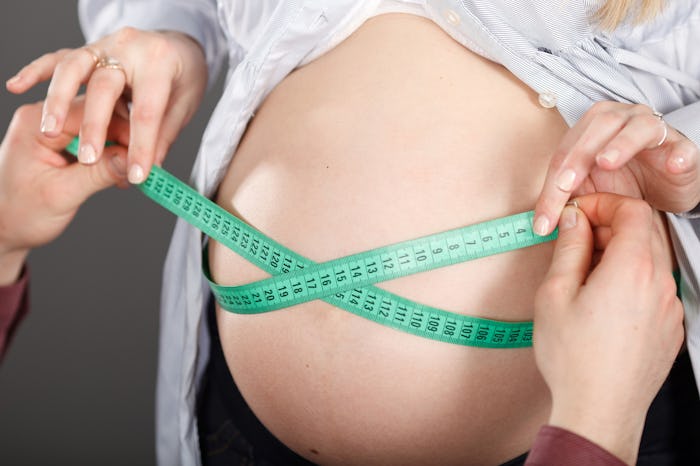Life

9 Signs Your Baby Is Going To Be Big
When you're awaiting the birth of a child, your mind is filled with so many questions about what your baby will be like. Bald, or a full head of hair? A champion sleeper, or a night-time terror? A tiny little peanut, or a big bruiser? For most of these questions, moms can do nothing but wait and see. But on the issue of size, there are some signs that your baby might be big that you can watch out for.
Moms have different reasons for wanting to know beforehand how big their baby is going be, as WebMd reported. Some want to know whether they should bother buying newborn clothes and diapers, or skip them altogether and go right to the next size up. Others, however, are focused on the physical aspect of it — after all, that baby has to come out somehow and a larger baby could potentially mean a tougher labor.
There's no surefire way to know how big your baby is going to be, Dr. Jeanne Shield, the director of the division of maternal-fetal medicine at Johns Hopkins Medicine, tells Romper. “There’s a lot of nonspecific things that may say, ‘OK, you’re having a big baby’, but there’s no one good way of measuring,” she says. There are, however, many different things that can help you and your doctor make a more accurate guess. Here are nine things that could let you know whether or not you’re about to give birth to a big baby.
1Your Ultrasound
Your doctor can estimate your baby's size by taking an ultrasound, reported Parents. It's important to remember that this isn't an exact science and you could still be in for a surprise no matter what you're told. Doctors are typically also tracking your baby’s size the old-fashioned way (the fundal height) during your pregnancy check ups. “We use that tape measure to measure the belly when you’re having prenatal care visits,” says Dr. Sheffield, so it’ll be flagged if anything seems out of the ordinary size-wise.
2Your Pregnancy Weight Gain
Gaining more weight than doctors recommend when you're pregnant ups the chances of fetal macrosomia, or a large baby. Depending on your pre-pregnancy weight, doctors typically suggest gaining no more than 35 pounds (or 20 if you're considered medically obese). Your weight can also mean more guesswork. “Some moms, especially moms that have a BMI over a certain amount, it can be very difficult to tell if you’re having a big or small baby,” Sheffield said.
3You Or Your Partner Are Tall
Are either biological parents on the taller side? If so, Kids Health noted that your baby might be, too. Geneticists have actually studied the heights of thousands of pregnant moms, and found that it revealed a lot about their babies, according to Dr. Louis Muglia, the co-director of the Perinatal Institute at Cincinnati Children's Hospital Medical Center. "We found that... maternal height was very significantly associated with the duration of the pregnancy, the weight of the baby at birth, and the length of the baby at birth."
4This Isn't Your First Child
Birth order plays a role in determining your baby's size. Second (or later) babies tend to be bigger than first borns. There's evidence that second babies tend to be bigger than first babies, according to a BabyCentre Uk article approved by the BabyCentre Medical Advisory Board. This isn’t par for the course, however, but on average, your second baby could be about 3.5 ounces heavier than your first.
5You've Had Other Big Babies
Was your first baby on the larger side? If yes, Baby Center noted that you can expect your next baby to be big as well — maybe even bigger. The site referenced a 2014 study published in the International Journal of Environmental Research and Public Health, in which doctors found that weight typically increased significantly between a firstborn child and a subsequent sibling.
6You're Having A Boy
If you've got a baby boy on the way, you might end up with a big one. The Mayo Clinic reported that boys tend to be slightly larger than girls at birth. The 2014 study referenced above also found similar results.
7You Develop Gestational Diabetes
Being diagnosed with gestational diabetes (GD) significantly raises the chances of having a big baby, according to Stanford Children's Health. GD causes the amount of glucose in your body to spike, and that makes its way to the baby.
8Your Own Birth Weight
As Baby Center noted, several studies have found that a mother's birth weight is a strong predictor of her baby's size. Interestingly, one such study from the University of Washington found that when it comes to a parent's birthweight as a predictor of infant birthweight, the relationship is strongest between mother-daughter pairs. So, if you were a big baby, and you're having a girl, you just might be having a... big baby girl.
9You're Younger Than 17
Your age when you get pregnant can have an impact on your baby's size. Moms who are 17 or younger are more likely to give birth to big babies, according to the American College of Obstetricians and Gynecologists.
Studies referenced:
Bacci, S. (2014) "Differences in Birthweight Outcomes: A Longitudinal Study Based on Siblings," Int J Environ Res Public Health, https://www.ncbi.nlm.nih.gov/pmc/articles/PMC4076673/
Experts:
Dr. Jeanne Sheffield, Director of the Division of Maternal-Fetal Medicine at Johns Hopkins Medicine
Dr. Louis Muglia, Co-Director of the Perinatal Institute at Cincinnati Children's Hospital Medical Center
This article was originally published on